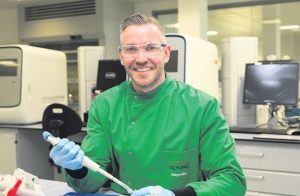Role: Research and Development (R&D) Team Leader
Company: Almac
Track Record: Paul Medlow had initially planned a career as a PE teacher before discovering an interest in science and laboratory based research.
Give a brief outline of your career to date.
After graduation I started as a technologist in Almac Diagnostics where I built my laboratory skills. Within two years I was promoted to senior technologist before accepting a one year secondment to North Carolina to set up a new laboratory in Durham. Almac’s customer base in America is continuously growing so our Diagnostic facility had to expand apace. The opportunity to travel to the States allowed me to bring new technologies into the company and drive my personal development. I have since returned to Craigavon where I am now a team leader in our R&D department.
What was your favourite subject at school?
I didn’t really have a favourite subject but rather a moderate interest across the board. If truth be told, I wasn’t the most studious while at college but I particularly enjoyed PE.
Did you go on to further/higher education, if so what did you study and where?
Having performed poorly in my A-levels and following a short period of full-time employment I completed an HND in Leisure Management at BIFHE; I then gained entry into the BSc Hons degree in Sports & Exercise Science at University of Aberdeen. I initially hoped to pursue a career in teaching PE, however the emphasis on science and laboratory based research within the degree course really grasped my interest. This, in turn, drove me back home to Northern Ireland where I completed a PhD in Exercise Physiology at Ulster University researching exercise and oxidative stress in obesity and Type II Diabetes.
How did you get into your area of work?
While at university I gained valuable practical experience in molecular biology research, which helped me secure a Core Lab Technologist position at Almac Diagnostics. Ongoing training in personal development at Almac has enabled me to progress my career to become a laboratory team leader with the R&D department.
Is this what you always wanted to do?
While at school I wasn’t 100% clear on what career I wanted to pursue. Although I enjoyed science, it wasn’t until I was at university that I realised human science and research was for me.
Were there any particular essential qualifications or experience needed?
An undergraduate degree in a science-based subject is essential. The knowledge and personal skills gained during doctorate research are invaluable but some of these skills can also be gained through work experience. Anyone interested in a career in the pharma industry should gain as much practical experience as possible, whether as university placement or summer internship.
Are there alternative routes into the job?
There are two main routes. By entering the industry at ground level and scaling the ladder, like myself, or directly applying for a post. I place great value in the former, especially if your background is in academia which is very different from working in industry. Starting at ground level within industry enables you to build your knowledge slowly and learn from colleagues that have been working in the sector longer.
What are the main personal skills your job requires?
Good communications is a must as you will have to interact on a daily basis with a variety of people from different disciplines, it is important that you can adapt, as not everyone is a scientist. You must be pro-active, showing initiative when things don’t exactly go to plan. The positioning of our products within the marketplace can also change, impacting on our projects, so it is important to be flexible, re-organising appropriately and managing your team’s time effectively.
What does a typical day entail?
Each morning the team discuss the status of current and upcoming projects. After that, the role can vary day by day. Some days may be spent desk bound, where I write project plans, draft lab reports or review data while other days I may be in the lab generating data. One constant throughout the day is regular meetings with senior management, project management and data analysis teams.
What are the best and most challenging aspects of the job?
In this industry decisions on product positioning can change frequently and as a result the prioritisation of our product development projects can also change. As such, re-structuring the team, re-evaluating project requirements and organising resources can be quite challenging, however seeing the data the team generates coming to fruition in the form of a product that ultimately will have an impact on patient treatment makes it worthwhile.
Why is what you do important?
Cancer medicine had long been viewed with a ‘one size fits all’ approach. In recent years, and with advances in technology, it has become clear this is not the case and the way patients are treated has become more personalised. With access to the latest technology, the data our team generates leads to the development of novel diagnostic tests supporting personalised medicine and helps physicians make the correct treatment decision for their patient.
What advice would you give anyone looking to follow a similar career path?
Gain as much experience as possible.
If you could go back, what is the one piece of advice you would give yourself on your first day?
Try to leave your work at work.
Describe your ideal day off.
I like the simple things in life so a morning gym session and lunch with my wife would set the day off.
I would then watch my local football team hopefully win, followed by an evening meal and a couple of drinks with friends.


